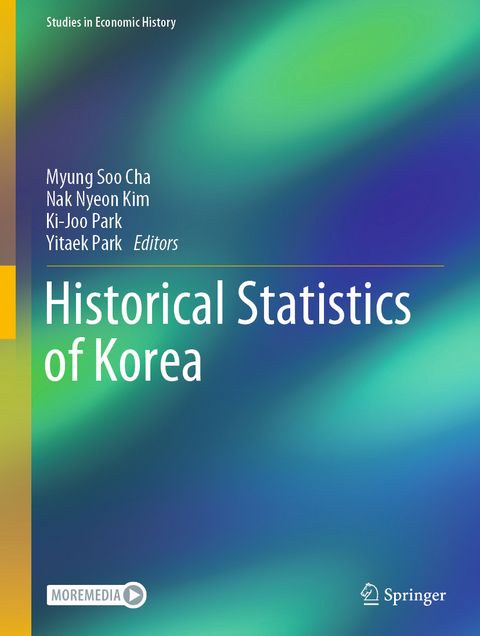
Historical Statistics of Korea
Springer Verlag, Singapore
978-981-15-3873-5 (ISBN)
Myung Soo Cha Born in South Korea in 1955, Myung Soo Cha studied sociology at Seoul National University (M.A.) and economics at the graduate school of Seoul National University (M.Econ.) and obtained doctorate at Warwick University with a dissertation on the cyclical interaction among Argentina, Britain, Germany, and the U.S. He visited Harvard University in 1993/5 and Hitotsubashi University as a visiting scholar in 2000. He served on the board of editors of the Australian Review of Economic History from 2008-2018 and has taught the Korean economic history, the Korean economic development, and macroeconomics at the School of Economics and Finance, Yeungnam University. Regular participants at international conferences on economic history, he delivered a keynote speech at the Asian Historical Economics Congress held in Seoul in 2016 on the historical origins of the South Korean growth miracle. Nak Nyeon Kim Born in South Korea in 1957 Nak Nyeon Kim studied economics at Seoul National University (B.A.) and wrote a Ph.D. dissertation on the economic development of Korea under Japanese rule at Tokyo University. He has taught economic history, growth economics, and income and wealth distribution in the economics department of Dongguk University since 1993. Having served as the president of the Korean Economic History Society in 2013, Nak Nyeon Kim is currently the director of the Naksongdae Institute of Economic Research, a research center specializing in quantitative research on the development of the Korean economy. Since 2016, he has advised the National Statistical Office of South Korea on the improvement of the quality of statistical information made publicly available. In 2016, the South Korean government awarded Nak Nyeon Kim the Order of Service Merit in recognition for his contribution to the measurement of the change in income and wealth distribution. Ki-Joo Park Born in South Korea in 1961, Ki-Joo Park was educated at the Economics Department and Graduate School of Seoul National University (B.A., M.Econ. and Ph.D.). His doctoral research investigated the rise of the mining industry in late nineteenth and twentieth century Korea. Associated with the Naksongdae Institute of Economic Research as a research fellow from 2000-05, he taught Economic History and the History of Economics at Seoul National University and Sukmyung University, which was followed by the shift to Sungshin Women’s University in 2006. He served as the president of the Korean Economic History Society in 2016. Yitaek Park Born in South Korea in 1965, Yitaek Park studied economics at Seoul National University (B.A., M.Econ, and Ph.D.). His Ph.D. dissertation describes the development of communications sector in Korea under Japanese rule. Having been associated with Sungkyunkwan University as a post-doctoral fellow, lecturer, and research assistant professor from 2002-10, he has worked as a research professor at Korea University from 2011. He visited the Institute of Economic Research, Hitotsubashi University as a visiting scholar in 2006/7 and served as the editor-in-chief of the journal published by the Korean Economic History Society, Review of Economic History from 2016-18.
1 Environment and Geography (Myung Soo Cha, Junseok Hwang, and Heejin Park).- 2 Population (Myung Soo Cha and Heejin Park).- 3 Labor Force and Employment (Yitaek Park).- 4 Wages (Myung Soo Cha, Junseok Hwang, and Wooyoun Lee).- 5 Education (Sun Go and Ki-Joo Park).- 6 Health (Suk Chul Hong).- 7 Agriculture (Seok Con Cho).- 8 Natural Resources (Wooyoun Lee, Sang Yun Ryu, and Kyoung Eun Song).- 9 Construction and Housing (Yitaek Park).- 10 Manufacturing (Ki-Joo Park).- 11 Distribution (Young-Jun Cho).- 12 Transportation and Communications (Chaisung Lim).- 13 Service Industry and Public Utilities (Sang-Cheol Lee).- 14 National Income (Nak Nyeon Kim).- 15 Prices (Ki-Joo Park, Young Hoon Rhee, and Young-Jun Cho).- 16 Capital and Wealth (Myung Soo Cha).- 17 Science and Technology (Jea Hwan Hong).- 18 Business Organization (Jea Hwan Hong).- 19 Monetary and Financial System (Young Mok Bae, Hun-Chang Lee, and Lee, Myunghwi).- 20 Public Sector (Jae Ho Kim).- 21 Law and Order(Duol Kim).- 22International Trade and Exchange Rates (Nak Nyeon Kim and Ki-Joo Park).- References.
| Erscheinungsdatum | 21.07.2022 |
|---|---|
| Reihe/Serie | Studies in Economic History |
| Zusatzinfo | 4 Illustrations, black and white; XIV, 1277 p. 4 illus. In 2 volumes, not available separately. |
| Verlagsort | Singapore |
| Sprache | englisch |
| Maße | 210 x 279 mm |
| Themenwelt | Geschichte ► Teilgebiete der Geschichte ► Wirtschaftsgeschichte |
| Wirtschaft ► Allgemeines / Lexika | |
| Wirtschaft ► Volkswirtschaftslehre ► Makroökonomie | |
| Schlagworte | Colonial Korea • Economic Growth • Industrialization • Regime Changes • South Korea • Time Series Economic Data |
| ISBN-10 | 981-15-3873-5 / 9811538735 |
| ISBN-13 | 978-981-15-3873-5 / 9789811538735 |
| Zustand | Neuware |
| Informationen gemäß Produktsicherheitsverordnung (GPSR) | |
| Haben Sie eine Frage zum Produkt? |
aus dem Bereich


